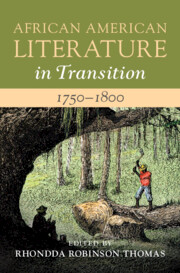Book contents
- African American Literature in Transition, 1750–1800
- African American Literature in Transition
- African American Literature in Transition, 1750–1800
- Copyright page
- Contents
- Contributors
- Preface
- Chronology
- Introduction
- Part I Limits and Liberties of Early Black Print Culture
- Chapter 1 Early Black Evangelical Writing and the Limits of Print
- Chapter 2 The Circulation of Early Black Atlantic Literature
- Chapter 3 What Makes a Text “Black”?
- Part II Black Writing and Revolution
- Part III Early African American Life in Literature
- Part IV Evolutions of Early Black Literature
- Index
Chapter 3 - What Makes a Text “Black”?
From Authorship to Metadata
from Part I - Limits and Liberties of Early Black Print Culture
Published online by Cambridge University Press: 01 April 2022
- African American Literature in Transition, 1750–1800
- African American Literature in Transition
- African American Literature in Transition, 1750–1800
- Copyright page
- Contents
- Contributors
- Preface
- Chronology
- Introduction
- Part I Limits and Liberties of Early Black Print Culture
- Chapter 1 Early Black Evangelical Writing and the Limits of Print
- Chapter 2 The Circulation of Early Black Atlantic Literature
- Chapter 3 What Makes a Text “Black”?
- Part II Black Writing and Revolution
- Part III Early African American Life in Literature
- Part IV Evolutions of Early Black Literature
- Index
Summary
This chapter proposes that if scholars accepted the idea that authorship was but one form of creative contribution among many to the production of literary texts, our recognition of the breadth, impact, and influence of African Americans in all kinds of presumptive white literary production would allow us to expand the category “African American literature” considerably. Book history offers empirical and conceptual measures for conceiving “African American literature” as (1) texts read or consumed by African Americans, (2) texts that are about African Americans or that represent the experiences of African Americans, (3) texts to which African Americans deployed trades or skills (such as engraving, typesetting, bookkeeping, shipping) that may not bear the dignity of creative genius, or (4) texts that are edited by African Americans – in addition to and overlapping with (5) the more familiar conception of “African American literature” as texts authored by African Americans. Drawing examples from Phillis Wheatley’s Poems, Frederick Douglass’s Paper, and The Prodigal Daughter with illustrations by the enslaved Peter Fleet, this essay does not dispute the historical significance of African American literary and textual production so much as to think historically and theoretically about why authorship has been such a prominent part of that significance.
Keywords
- Type
- Chapter
- Information
- African American Literature in Transition, 1750–1800 , pp. 73 - 96Publisher: Cambridge University PressPrint publication year: 2022

